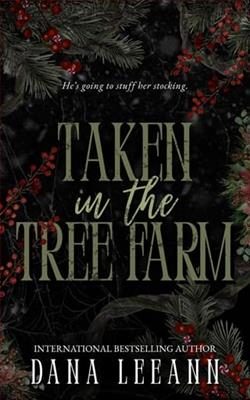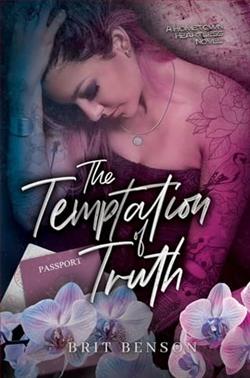Page 19 of Ruby (Landry 1)
"I wish you didn't have to work so hard, Grandmere. Grandpere Jack should do more for us instead of drinking up his money or gambling it away," I declared.
"He can't do anything for himself, much less for us. Besides, I don't want anything from him. His money's tainted," she said firmly.
"Why is his money any more tainted than any other trapper's in the bayou, Grandmere?"
"His is," she insisted. "Let's not talk about it. If anything sets my heart beating like a parade drum, that does."
I swallowed my questions, afraid of making her sicker and more tired. Instead, I put on my dress and polished my shoes. Tonight, because the weather was unstable with intermittent showers and stronger winds, Paul was going to use one of his family's cars. He told me his father had said it was all right, but I had the feeling he hadn't told them everything. I was just too frightened to ask and risk not going to the dance. When I heard him drive up, I rushed to the door. Grandmere Catherine followed and stood right behind me.
"He's here," I cried.
"You tell him to drive slowly and be sure you're home right after the dancing," Grandmere said.
Paul rushed up to the galerie. The rain had started again, so he held an umbrella open for me.
"Wow, Ruby, you look very pretty tonight," he said, then saw Grandmere Catherine step out from behind me. "Evening, Mrs. Landry."
"You get her home nice and early," she ordered.
"Yes, ma'am."
"And drive very carefully."
"I will."
"Please, Grandmere," I moaned. She bit down on her lip to keep herself silent and I leaned forward to kiss her cheek.
"Have a good time," she muttered. I ran out to slip under Paul's umbrella and we hurried to the car. When I looked back, Grandmere Catherine was still standing in the doorway looking out at us, only she looked so much smaller and older to me. It was as if my growing up meant she was to grow older, faster. In the midst of my excitement, an excitement that made the rainy night seem like a star-studded one, a small cloud of sadness touched my thrilled heart and made it shudder for a second. but the moment Paul started driving away, I smothered the trepidation and saw only happiness and fun ahead.
The fais dodo hall was on the other side of town. All furniture, except for the benches for the older people, was moved out of the large room. In a smaller, adjoining room, large pots of gumbo were placed on tables. We didn't have a stage as such, but platforms were used to provide a place for the musicians, who played the accordion, the fiddle, the triangle, and guitars. There was a singer, too.
People came from all over the bayou, ma
ny families bringing their young children as well. The little ones were put in another adjoining room to sleep. In fact, fais dodo was Cajun baby talk for go-tosleep, meaning put all the small kids to bed so the older folks could dance. Some of the men played a card game called bourre while their wives and older children danced what we called the Two-step.
Paul and I no sooner entered the fais dodo hall than I could hear the whispers and speculations on people's lips--what was Paul Tate doing with one of the poorest young girls in the bayou? Paul didn't seem as aware of the eyes and the whispering as I was, or if he was, he didn't care. As soon as we arrived, we were out on the dance floor. I saw some of my girlfriends gazing at us with green eyes, for just about every one of them would have liked Paul Tate to bring her to a fais dodo.
We danced to one song after another, applauding loudly at the end of each song. Time passed so quickly that we didn't realize we had danced nearly an hour before we decided we were hungry and thirsty. Laughing, feeling as if there were no one else here but the two of us, we headed for refreshments. Both of us were oblivious to the group of boys who followed along, lead by Turner Browne, one of the school bullies. He was a stout, bull-necked seventeenyear-old with a shock of dark brown hair and large facial features. It was said that his family went back to the flatboat polers who had navigated the Mississippi long before the steamboat. The polers were a rough, violent bunch and the Brownes were thought to have inherited those traits. Turner lived up to the family reputation, getting into one brawl after another at school.
"Hey, Tate," Turner Browne said after we had gotten our bowls of gumbo and sat at the corner of a table. "Your mommy know you're out slumming tonight?"
All of Turner's friends laughed. Paul's face turned crimson. Slowly, he stood up.
"I think you'd better take that back, Turner, and apologize."
Turner Browne laughed.
"What'cha gonna do, Tate, tell your daddy on me?"
Again, Turner's friends laughed. I reached up and tugged on Paul's sleeve. He was red-faced and so angry he seemed to give off smoke.
"Ignore him, Paul," I said. "He's too stupid to bother with."
"Shut your mouth," Turner said. "At least I know who my father is."
At that, Paul shot forward and tackled the much larger boy, knocking him to the floor. Instantly, Turner's friends let up a howl and formed a circle, around Paul and Turner, blocking out anyone who might have rushed to put a quick end to it. Turner was able to roll over Paul and pin him down by sitting on his stomach. He delivered a punch to Paul's right cheek. It swelled up almost instantly. Paul was able to block Turner's next punch, just as the older men arrived and pulled him off Paul. When he stood up, Paul's lower lip was bleeding.
"What's going on here?" Mr. Lafourche demanded. He was in charge of the hall.















